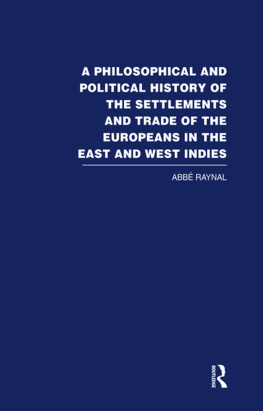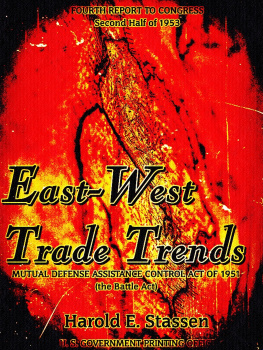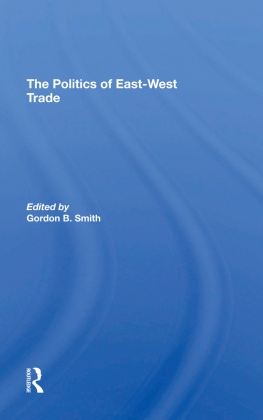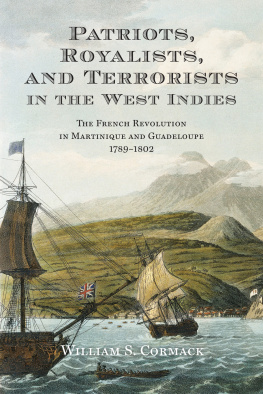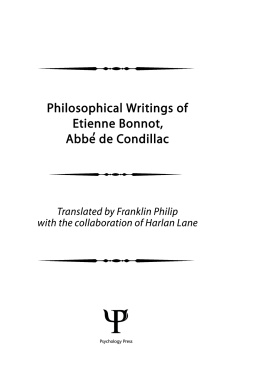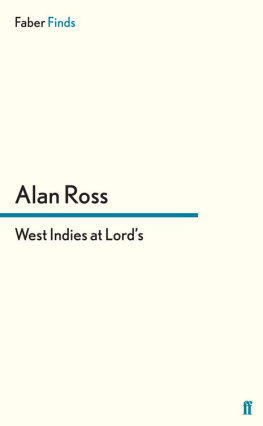A PHILOSOPHICAL AND POLITICAL HISTORY OF THE SETTLEMENTS AND TRADE OF THE EUROPEANS IN THE EAST AND WEST INDIES
First published 1777 by Routledge
2 Park Square, Milton Park, Abingdon, Oxfordshire 0X14 4RN
605 Vanderbilt Avenue, New York, NY 10017
Routledge is an imprint of Taylor & Francis Group, an informa business
First issued in hardback 2019
Copyright 1777 Abb Raynal
First issued in hardback 2019
All rights reserved. No part of this book may be reprinted or reproduced or utilised in any form or by any electronic, mechanical, or other means, now known or hereafter invented, including photocopying and recording, or in any information storage or retrieval system, without permission in writing from the publishers.
Notice: Product or corporate names may be trademarks or registered trademarks, and are used only for identification and explanation without intent to infringe.
British Library Cataloguing in Publication Data
A CIP catalogue record for this book is available from the British Library
A Philosophical and Political History of the Settlements and Trade of the Europeans in the East and West Indies, Volume IV
ISBN 13: 978-0-415-38317-2 (volume) (hbk)
ISBN 13: 978-0-415-38311-0 (set)
Routledge Library Editions: A Philosophical and Political History of the Settlements and Trade of the Europeans in the East and West Indies
A
PHILOSOPHICAL AND POLITICAL
HISTORY
OF THE
SETTLEMENTS AND TRADE
OF THE
EUROPEANS
IN THE
EAST AND WEST INDIES.
Translated from the French of the
ABB RAYNAL,
By J. JUSTAMOND, M. A.
THE THIRD EDITION:
REVISED AND CORRECTED.
WITH MAPS ADAPTED TO THE WORK,
AND A COPIOUS INDEX.
VOLUME THE FOURTH.
LONDON:
Printed for T. CADELL, in the Strand.
MDCCLXXVII.
BOOK XII. Settlements of the Spaniards, the Dutch, and the Danes in the American islands.
BOOK XII. A Spainish colony formed on the banks of the Oronooko, The use that has been, and may be, made of it.
The honour of having discovered the great Archipelago of the Caribbee islands, and of having formed the first settlements on them, is due to Spain. The most advanced of these from the formed on American continent is called Trinidad. Columbus landed on it in 1498, when he discovered the Oronooko; but other objects interfering, both the island and the coasts of the neighbouring continent were at that time neglected. But the lustre of the gold, which had been seen from a distance glittering on the shore, caused them to be revisited by the nation which had first made the discovery. The conquest of those immense regions, which are watered by one of the largest and richest rivers of the universe, was resolved upon; and the island of Trinidad, situated at the mouth of the Oronooko, was peopled, in order to insure and facilitate the execution of so great an enterprize. An island has always the advantage of a continent, when, having but a small extent of country to defend, it has a very large one to attack; as was the case in the present instance.
The river Oronooko, which, as is commonly believed, springs from the Cordeleras, after being increased in a course of five hundred and seventy-five leagues by the influx of a great number of rivers of different magnitude, empties itself into the ocean by more than fifty channels. Its impetuosity is so great, that it items the most powerful tides, and preserves the freshness of its waters to the distance of twelve leagues from that vast and deep channel within which it was confined. But this rapidity is not always equal, and owes its variations to a circumstance, perhaps, entirely peculiar. The Oronooko, in the month of April, begins to swell, and continues to rise during five months; the sixth it remains at its greatest height; in October, it begins to subside, and falls gradually till the month of March, during which it continues in a fixed state of its greatest diminution. These alternate changes are regular even to certainty.
This phnomenon, the cause of which is not known, seems to depend much more on the sea than on the land. In the fix months that the river is rising, the hemisphere of the New world presents nothing but seas, at least but little land> to the perpendicular action of the rays of the fun. In the fix months of its fall, America exhibits nothing but dry land to the planet by which it is illuminated. The sea, at this time, is less subject to the influence of the sun, or, at least, its current towards the eastern shore is more balanced, more broken by the land, and must, therefore, leave a freer course to the rivers, which, not being then fo strongly confined by the sea, cannot be swelled but by rains, or by the melting of the snows from the Cordeleras. Perhaps, indeed, the rising of the waters of the Oronooko may depend entirely on the rainy season. But to be thoroughly acquainted with the causes of so singular a phnomenon, it would be necessary to confider, how far the course of this river may be affected by that of the Amazons, and to know the track and direction both of the one and the other. From the difference of their situation, their source, and their opening into the sea, it is not improbable, that the cause of so remarkable a difference in the periods of their flux and reflux might be discovered. All things are connected in this worldly system. The courses of rivers depend either on the diurnal or annual revolutions of the earth. Whenever an enlightened people shall acquire a knowledge of the banks of the Oronooko, they will discover, or, at least, they will attempt to discover, the causes of these phenomena. But their endeavours will be attended with difficulties. The river is not so navigable as it might be presumed from its magnitude; its bed is in many places filled up with rocks, which oblige the navigator at times to carry both his boats and the merchandise they are laden with.
The people who border on this river, but little distant from the burning Line, inhabiting a country, perhaps too fruitful to have been cultivated, know neither the trouble of clothes, the restraints of police, nor the burden of government. Free under the yoke of poverty, they live chiefly by hunting and fishing, and on wild fruits. But little of their time or labour can be spent on agriculture, where they have nothing but a stick to plough with, and hatchets made of stone to cut down trees, which, being burned or rotted, leave the soil in a proper state for bearing.
The state of servitude in which the women are kept in the New world, is undoubtedly the principal cause of the want of population in this part of the globe. This tyranny, which is universal, is more prevalent on the banks of the Oronooko, than in any other place. There are, therefore, few inhabitants in these countries, though greatly favoured by nature. Mothers have contracted the custom of destroying the daughters they bring forth, by cutting the navel-string so close to the body, that the children die of a haemorrhage. Christianity itself has not even been able to put a stop to this abominable practice. The Jesuit Gumilla confirms this fact; who, being informed that one of his converts had been guilty of such a murder, went to her in order to reproach her of lier crime in the strongest terms. The woman listened to the missionary without shewing the least signs of emotion. When he had finished his remonstrance, she desired leave to answer him; which she did in the following manner :

